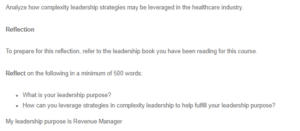Reflection – Leadership Purpose
My Leadership Purpose
According to George et al. (2008), leadership purpose lays the foundation for authentic leadership. The main characteristics of authentic leadership include the extent to which a leader sets high ethical and moral standards, the extent to which leaders solicit sufficient viewpoints and opinions before making important decisions, the extent to which a leader reinforces a degree of openness with other people that allow them to express their opinions, challenges, and ideas and the extent to which the leader is aware of their limitations and strengths, how others view them and how the leader impacts their followers. My leadership purpose, Revenue Manager, has played a significant role in enhancing my authentic leadership by enabling me to identify my strengths and weaknesses and the extent to which I express high moral and ethical standards and transparency. For instance, as a revenue manager, I have to ensure that ethical and moral standards are observed in allocating the financial resources required to complete tasks within the organization.
My leadership purpose has increased my level of transparency because I have to ensure that the organization reports accurate revenue reports to stakeholders. Applying leadership purpose in revenue management has also enabled me to develop strategies that effectively recognize revenue development opportunities to maximize the organization’s revenue. For instance, I apply leadership purpose to get viewpoints and opinions from my colleagues on how we can increase the organization’s revenue and improve revenue management. My leadership purpose also enables me to mobilize other employees to work towards a shared goal as a team to increase productivity and create a sense of belonging.
Leveraging Strategies in Complexity Leadership to Help Fulfill My Leadership Purpose
Complexity leadership includes observing and experiencing a situation from different viewpoints and considering other people’s opinions (Kershner, 2020). Complexity leadership also includes administrative, adaptive, and action-centered leadership (Bulutlar & Kamaşak, 2017). Administrative leadership is characterized by strict control and a bureaucratic hierarchy. Second, adaptive leadership focuses on solving problems, adapting to new conditions, and learning. Third, action-centered leadership focuses on immediate decision-making aimed at solving a crisis. Accordingly, I can use complexity leadership to help fulfill my leadership purpose in various ways. For instance, I can use administrative leadership to ensure that I am in charge of making decisions on how the organization should use revenue to fund its operations without interference from colleagues who may be interested in using the company’s revenue for personal gain. I can also use adaptive leadership to adjust to changes in the work environment that could impact my role as a revenue manager. For example, if the organization expands operations into other markets, my role as a revenue manager may become complex due to the increase in revenue and the need to monitor many revenue streams, hence the need for adaptive leadership to develop creative problem-solving strategies.
Action-centered leadership is also applicable in my role since a revenue manager also requires making quick decisions, especially when the organization is experiencing financial issues, to ensure that there are enough financial resources to fund critical operations. I can also leverage action-centered leadership to implement new ideas in the revenue management role to contribute to increasing organizational performance and effective revenue management. I can also leverage multiple viewpoints to solve problems I may experience in revenue management and get new ideas for improving my efficiency. I can also encourage my colleagues to share ideas on improving my performance as a revenue manager and solicit feedback from colleagues to understand my strengths and weaknesses that could impact my performance.
References
Bulutlar, F., & Kamaşak, R. (2017). Complex adaptive leadership for performance: A theoretical framework. Chaos, Complexity and Leadership 2012, 59–65. https://doi.org/10.1007/978-94-007-7362-2_9
George, B., McLean, A. N., & Craig, N. (2008). Finding your true north: A personal guide. Jossey-Bass.
Kershner, B. (2020). Complexity leadership. Understanding Educational Complexity, 9–24. https://doi.org/10.1163/9789004447837_002
ORDER A PLAGIARISM-FREE PAPER HERE
We’ll write everything from scratch
Question

Reflection – Leadership Purpose
Analyze how complexity leadership strategies may be leveraged in the healthcare industry.
Reflection
To prepare for this reflection, refer to the leadership book you have been reading for this course.
Reflect on the following in a minimum of 500 words:
- What is your leadership purpose?
- How can you leverage strategies in complexity leadership to help fulfill your leadership purpose?
My leadership purpose is Revenue Manager

